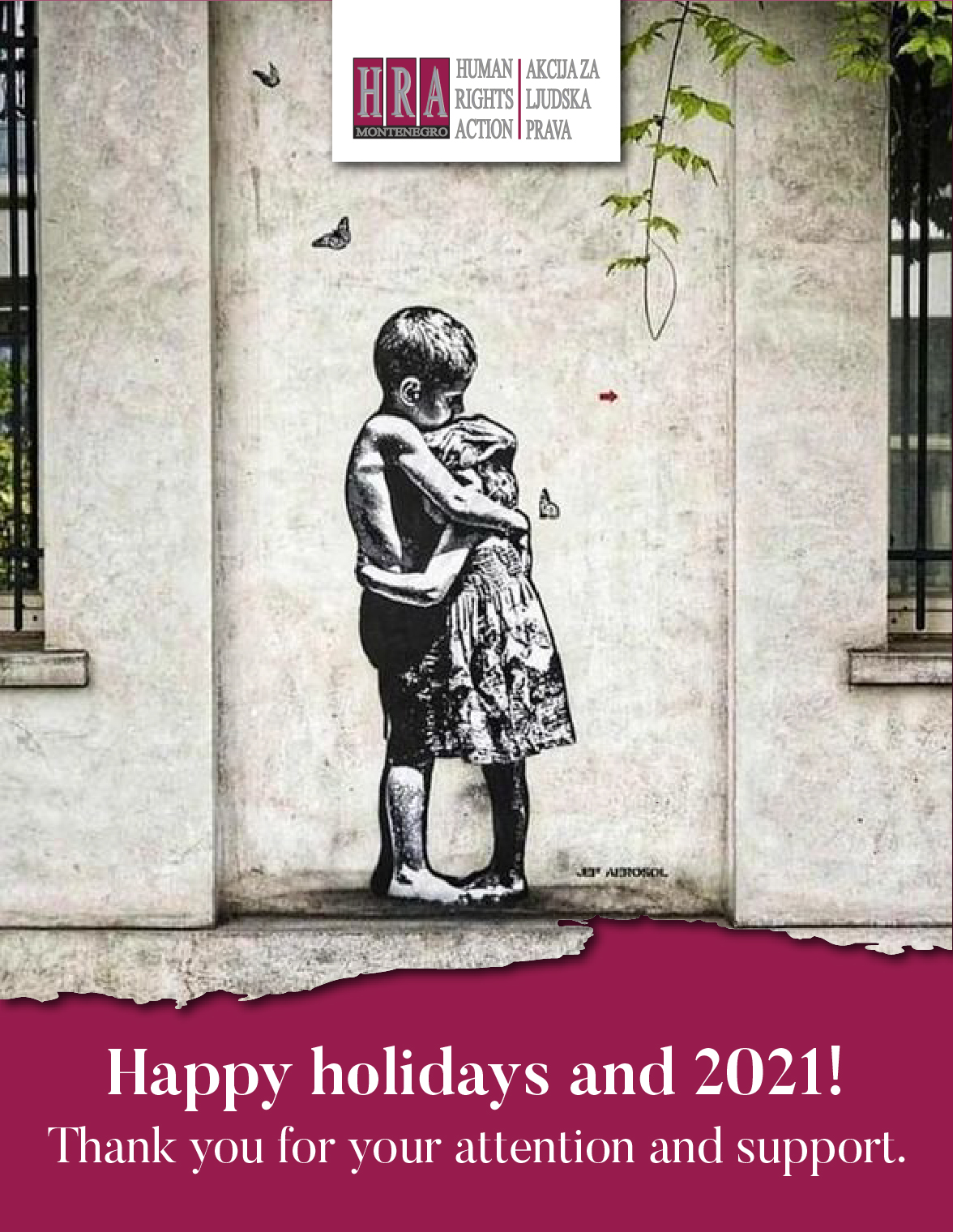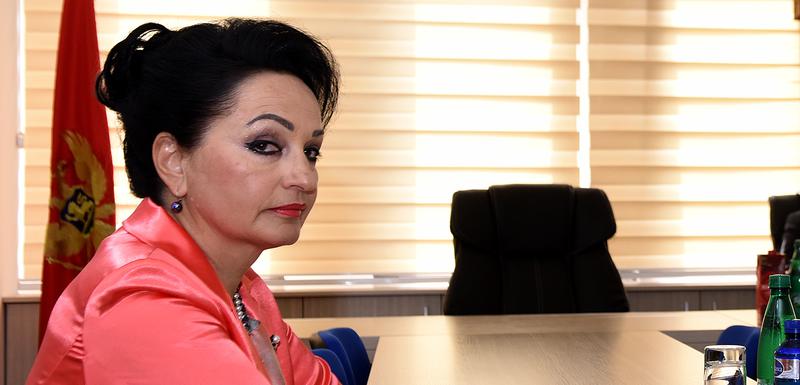
Happy holidays and 2021!
31/12/2020
POSTPONE WRITTEN TESTING OF CANDIDATES FOR JUDGES
22/01/2021AN END TO PERSONAL DOMINATIONS WITHIN THE JUDICIARY IS A BEGINNING TO FUNDAMENTAL REFORM

Photo: Savo Prelević
The Human Rights Action (HRA) welcomes the resignations of Vesna Medenica from her position as President of the Supreme Court, Branko Vučković as President of the Basic Court in Kotor, and Hilmija Sujković as President of the Basic Court in Plav. All three have tendered their resignations to the Judicial Council on New Year’s Eve.
We anticipate further resignations from the Pesidents of Basic Courts in Žabljak – Mihailo Anđelić, Rožaje – Zahit Camić, Bijelo Polje – Radule Piper, Berane – Dragan Dašić, Kolašin – Arsen Popović, Bar – Goran Šćepanović, and Danilovgrad – Milica Jovović.
All of them were appointed to presidential positions by the Council in violation of the Constitution. Namely, the appointments were contrary to the legal limit stipulating that the same individual cannot be elected to the position of president of the same court more than twice.
These changes are crucial in the liberation of the judiciary from ossified personal dominations and decade-long monopolies. Finally, new people have the chance to improve the standards of professionalism and independence both individually and in the judiciary as a whole.
Aside from the local professional public, which publicly and unanimously opposed the Council’s interpretation that reelected persons have the right to carry out a third, fourth, fifth, sixth, and even eight presidential term, the European Commission also expressed concern over the Council’s reading of the regulations concerning the election of the same individuals to leadership positions within the judiciary, and indicated that such an interpretation was also contrary to the stance of the Council of Europe (GRECO).
HRA expresses hope that a civilisational achievement in the battle against corruption such as the limitation on the number of terms in presiding positions, a regulation prescribed both by the Constitution and the Law on Presidents of State and Presidents of Courts, will soon become a generally accepted moral norm in Montenegro. It must be remembered that, regrettably, all 18 judges of the Supreme Court of Montenegro, alongside 9 members of the Judicial Council, in addition to the aforementioned reelected Presidents led by the President of the Supreme Court, all rose up against this norm without any explanation.
HRA also welcomes the resignation of Supreme Court judge Rada Kovačević from the Judicial Council, and expects that the remaining members of that council also tender their resignations. The members in question are Vesna Simović Zvicer, Dobrica Šljivančanin, Loro Markić, Ana Perović Vojinović, Verica Sekulić, and Dragana Babović.
This lineup of the Council has been operating from a position of disputed legitimacy for over two years, and has caused numerous scandals. They violated the Constitution and the Law by electing the President of the Supreme Court and nine Presidents of Basic Courts, as well as prolonging the mandates of a significant number of judges, all before a decision on the initiative for determining the constitutionality of such actions was reached. Furthermore, they are responsible for the scandalous election of candidates for Basic Court judges, wherein they falsified assessments of interviews which they either never conducted or conducted improperly. In this same election process, they either favoured or turned a blind eye to the favouring of children of friends and associates. The Council invented legal interpretations which concerned the European Union, and even ignored public pressures on judges whom they had to protect from a position of defending judicial integrity and independence. These are only the cases which HRA followed and documented. Other accusations remain to be investigated, such as those substantiated by the negative reporting of the State Audit Institution (DRI) regarding the Council’s financial dealings, as well as claims pertaining to the illegal influencing of judges by certain members.
We also expect that commensurate reforms within the State Prosecutor’s Office will contribute to a climate of lawfulness and rule of law within which these actions will be recognized as the criminal acts of professional negligence and abuse of office for personal gain.
Furthermore, we consider that the mandate of Mrs. Rada Kovačević, who still works as a Supreme Court Judge, has expired, despite the refusal of the General Assembly of the Supreme Court and the Judicial Council to recognize this fact. According to Article 17 of the Law on Pension and Disability Insurance, she fulfils age-based pension criteria, while Article 121 paragraph 2 of the Constitution of Montenegro remains unequivocal – a judge’s function ceases once the fulfil the conditions for securing an age-based pension. According to available information, this is the case with six other judges of the Supreme Court (table 2 in the annex).
HRA expects the Ministry of Justice to immediately recommend changes and supplements to the Law on the Judicial Council and Judges, with the aim of implementing GRECO recommendations and prescribing conditions for the selection of Judicial Council members that would prevent conflicts of interest and specifically ensure that the Council membership from the ranks of lawyers is comprised of people of integrity, who will not allow political or other private interests to overshadow the Constitution and the Law, as they thus far have.
ANNEX 1:
List of Presidents of Courts who were selected for more than two mandates:
- Vesna Medenica, Supreme Court of Montenegro, President since December 2007;
- Branko Vučković, Basic Court (OS) Kotor – eight mandate, President since 1989;
- Hilmija Sujković, OS Plav – third mandate, President since 2009;
- Milica Jovović, OS Danilovgrad – third mandate, President since 2009;
- Goran Šćepanović, OS Bar – third mandate, President since 2008;
- Arsen Popović, OS Kolašin – third mandate, President since 2006;
- Dragan Dašić, OS Berane – fourth mandate, President since 2001;
- Radule Piper, OS Bijelo Polje – third mandate, President since 2009;
- Zahit Camić, OS Rožaje – sixth mandate, President since 1993;
- Mihailo Anđelić, OS Žabljak – fifth mandate, President since 2001.
ANNEX 2:
List of judges whose functions had to have ceased (according to available biographical data):
Supreme Court of Montenegro
1.Vesna Medenica, acquired the condition by the stepping into force of the Law on Pension and Disability Insurance (ZPIO), based on Art. 17, para. 2;
- Rada Kovačević, acquired the condition by the stepping into force of ZPIO, based on Art. 17, para. 1;
- Lidija Ivanović, acquired the condition based on Art. 17, para. 1 in late December 2020, elected Supreme Court Judge two months prior;
- Branimir Femić, acquired the condition based on Art. 17, para. 1 in October 2020;
- Natalija Filipović, acquired the condition by the stepping into force of ZPIO, based on Art. 17, para. 1;
- Dragica Milačić, acquired the condition by the stepping into force of ZPIO, based on Art. 17, para. 1;
- Stanka Vučinić, Vice President, acquired the condition by the stepping into force of ZPIO, based on Art. 17, para. 1;
- Dušanka Radović, acquired the condition by the stepping into force of ZPIO, based on Art. 17, para. 1.
Misdemeanour Court in Budva
- Koviljka Đačić, President of the Misdemeanour Court in Budva, by the stepping into force of ZPIO, based on Art. 17, para. 1.
Basic Court in Rožaje
- Zahit Camić, President, based on Art. 17, para. 2. ZPIO.
Higher Court in Podgorica
- Dragica Vuković, acquired the condition by the stepping into force of ZPIO, based on Art. 17, para. 1;
- Miroslav Bašović, acquired the condition by the stepping into force of ZPIO, based on Art. 17, para. 1;
- Vjera Šljivančanin, acquired the condition by the stepping into force of ZPIO, based on Art. 17, para. 1;
- Verica Sekulić, acquired the condition by the stepping into force of ZPIO, based on Art. 17, para. 1;
- Miljana Pavlićević, acquired the condition by the stepping into force of ZPIO, based on Art. 17, para. 1.
Administrative Court of Montenegro
- Gordana Pot, acquired the condition by the stepping into force of ZPIO, based on Art. 17, para. 1;
- Biserka Bukvić, acquired the condition by the stepping into force of ZPIO, based on Art. 17, para. 1.
Misdemeanour Court in Bijelo Polje
- Branka Pantović, acquired the condition by the stepping into force of ZPIO, based on Art. 17, para. 1;
- Milutin Božović, acquired the condition by the stepping into force of ZPIO, based on Art. 17, para. 1.
Basic Court in Berane
- Međedović Aiša, acquired the condition by the stepping into force of ZPIO, based on Art. 17, para. 1.
Higher Court in Bijelo Polje
- Jadranka Ćulafić, acquired the condition by the stepping into force of ZPIO, based on Art. 17, para. 1;
- Nedjeljko Mrdak, acquired the condition by the stepping into force of ZPIO, based on Art. 17, para. 1;
- Šefkija Đešević, acquired the condition by the stepping into force of ZPIO, based on Art. 17, para. 1.
Montenegrin Court of Appeal
- Ratko Ćupić, acquired the condition by the stepping into force of ZPIO, based on Art. 17, para. 1;
- Milić Međedović, acquired the condition by the stepping into force of ZPIO, based on Art. 17, para. 1.
Higher Misdemeanour Court of Montenegro
- Vesna Šćepanović, acquired the condition by the stepping into force of ZPIO, based on Art. 17, para. 1;
- Dragica Kovačević, acquired the condition by the stepping into force of ZPIO, based on Art. 17, para. 1;
- Dragica Stojanović, acquired the condition by the stepping into force of ZPIO, based on Art. 17, para. 2;
We remain unsure with regard to the remaining judges due to a lack of biographical data.






 English
English